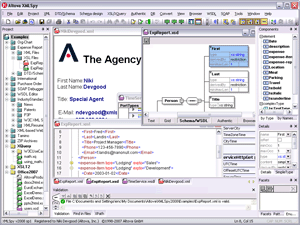Related Research Articles

Extensible Markup Language (XML) is a markup language and file format for storing, transmitting, and reconstructing arbitrary data. It defines a set of rules for encoding documents in a format that is both human-readable and machine-readable. The World Wide Web Consortium's XML 1.0 Specification of 1998 and several other related specifications—all of them free open standards—define XML.
In computing, the term Extensible Stylesheet Language (XSL) is used to refer to a family of languages used to transform and render XML documents.
XSLT is a language originally designed for transforming XML documents into other XML documents, or other formats such as HTML for web pages, plain text or XSL Formatting Objects, which may subsequently be converted to other formats, such as PDF, PostScript and PNG. Support for JSON and plain-text transformation was added in later updates to the XSLT 1.0 specification.
The Java programming language XML APIs developed by Sun Microsystems consist of the following separate computer-programming APIs:
Schematron is a rule-based validation language for making assertions about the presence or absence of patterns in XML trees. It is a structural schema language expressed in XML using a small number of elements and XPath.
James Clark is a software engineer and creator of various open-source software including groff, expat and several XML specifications.
Saxon is an XSLT and XQuery processor created by Michael Kay and now developed and maintained by his company, Saxonica. There are open-source and also closed-source commercial versions. Versions exist for Java, JavaScript and .NET.
An XML schema is a description of a type of XML document, typically expressed in terms of constraints on the structure and content of documents of that type, above and beyond the basic syntactical constraints imposed by XML itself. These constraints are generally expressed using some combination of grammatical rules governing the order of elements, Boolean predicates that the content must satisfy, data types governing the content of elements and attributes, and more specialized rules such as uniqueness and referential integrity constraints.
XPath 2.0 is a version of the XPath language defined by the World Wide Web Consortium, W3C. It became a recommendation on 23 January 2007. As a W3C Recommendation it was superseded by XPath 3.0 on 10 April 2014.
eXist-db is an open source software project for NoSQL databases built on XML technology. It is classified as both a NoSQL document-oriented database system and a native XML database. Unlike most relational database management systems (RDBMS) and NoSQL databases, eXist-db provides XQuery and XSLT as its query and application programming languages.

XMLSpy is a proprietary XML editor and integrated development environment (IDE) developed by Altova. XMLSpy allows developers to create XML-based and Web services applications using technologies such as XML, JSON, XBRL, XML Schema, XSLT, XPath, XQuery, WSDL and SOAP.
In computing, the two primary stylesheet languages are Cascading Style Sheets (CSS) and the Extensible Stylesheet Language (XSL). While they are both called stylesheet languages, they have very different purposes and ways of going about their tasks.

The Oxygen XML Editor is a multi-platform XML editor, XSLT/XQuery debugger and profiler with Unicode support. It is a Java application, so it can run in Windows, Mac OS X, and Linux. It also has a version that can run as an Eclipse plugin.
XProc is a W3C Recommendation to define an XML transformation language to define XML Pipelines.
libxslt is the XSLT C library developed for the GNOME project. It provides an implementation of XSLT 1.0, plus most of the EXSLT set of processor-portable extensions functions and some of Saxon's evaluate and expressions extensions. libxslt is based on libxml2, which it uses for XML parsing, tree manipulation and XPath support. It is free software released under the MIT License and can be reused in commercial applications.
XPath is an expression language designed to support the query or transformation of XML documents. It was defined by the World Wide Web Consortium (W3C) and can be used to compute values from the content of an XML document. Support for XPath exists in applications that support XML, such as web browsers, and many programming languages.
XQuery is a query and functional programming language that queries and transforms collections of structured and unstructured data, usually in the form of XML, text and with vendor-specific extensions for other data formats. The language is developed by the XML Query working group of the W3C. The work is closely coordinated with the development of XSLT by the XSL Working Group; the two groups share responsibility for XPath, which is a subset of XQuery.

An XML transformation language is a programming language designed specifically to transform an input XML document into an output document which satisfies some specific goal.
Zorba is an open source query processor written in C++, implementing
Stylus Studio is an integrated development environment (IDE) for the Extensible Markup Language (XML). It consists of a variety of tools and visual designers to edit and transform XML documents and legacy data such as electronic data interchange (EDI), comma-separated values (CSV) and relational data.
References
Specifications
- ↑ Namespaces in XML 1.0 (Third Edition), W3C
- ↑ xml:id Version 1.0, W3C
- ↑ XML Events, W3C
- ↑ XML Inclusions (XInclude) Version 1.0 (Second Edition), W3C
- ↑ XML Fragment Interchange, W3C
- ↑ XSL Transformations (XSLT), W3C
- ↑ XSL Transformations (XSLT) Version 2.0, W3C
- ↑ Extensible Stylesheet Language (XSL) Version 1.1, W3C
- ↑ EXSLT
- ↑ XML Linking Language (XLink) Version 1.1, W3C
- ↑ XML Base (Second Edition), W3C
- ↑ XPointer Framework, W3C
- ↑ XML Path Language (XPath), W3C
- ↑ XML Path Language (XPath) 2.0, W3C
- ↑ XML Path Language (XPath) 3.0, W3C
- ↑ XML Path Language (XPath) 3.1, W3C
- ↑ XQuery and XPath Full Text 1.0, W3C
- ↑ XML Schema Part 1: Structures Second Edition, W3C
- ↑ XML Schema Part 2: Datatypes Second Edition, W3C
- ↑ W3C XML Schema Definition Language (XSD) 1.1 Part 1: Structures, W3C
- ↑ W3C XML Schema Definition Language (XSD) 1.1 Part 2: Datatypes, W3C
- ↑ RELAX NG home page
- ↑ XML Signature Syntax and Processing (Second Edition), W3C
- ↑ XML Encryption Syntax and Processing, W3C
- ↑ XML Key Management Specification (XKMS), W3C
Gecko references
- ↑ Bug 275196 - xml:id support, Mozilla
- ↑ Bug 201754 - XML Inclusions (XInclude), Mozilla
- ↑ Bug 95959 - Mozilla does not support XSL:FO or XML Formatting Objects, Mozilla
- ↑ XLink - MDC, Mozilla
- ↑ SVG in Firefox, Mozilla
- ↑ Bug 396966 - Xpath 2.0, Mozilla
- ↑ Bug 385995 - Request to add XQuery, Mozilla
- ↑ Bug 22942 - (entities) Load external DTDs (entity/entities) (local and remote) if a pref is set, Mozilla
- ↑ Bug 227459 - Implement validating XML parser (validate with RELAX NG), Mozilla
- ↑ Bug 125528 - Implement xml signature support, Mozilla
- "Mozilla Developer Documentation". Mozilla XML support. Retrieved May 1, 2005.
WebKit references
- ↑ Bug 4079 - Support EXSLT with libexslt, WebKit
- ↑ Bug 10556 - Support XLink in any XML document, WebKit
- ↑ Bug 17423 - ER: Add support for xml:base, WebKit
- ↑ Bug 17491 - ER: Implement XPointer Support, WebKit
- ↑ Bug 16536 - Add XQuery support, WebKit
- ↑ Bug 3300 - XSLT parser ignores document DTD, WebKit
- "WebKit Standards Support Targets". Webkit XML support. Retrieved February 3, 2010.
Presto references
- "Opera Documentation". Web specifications supported in Opera. Archived from the original on June 4, 2012. Retrieved May 1, 2005.
Prince references
- ↑ Prince: XML Input, YesLogic
- "Prince XML Developer Documentation". Prince XML support. Retrieved May 1, 2005.
Antenna House references
- "AH Formatter V6.5 Online Manual". Antenna House support. Retrieved January 26, 2018.